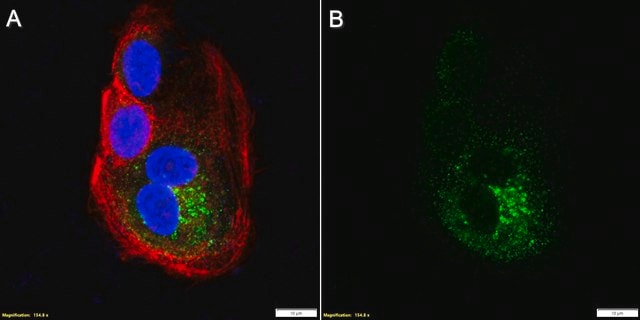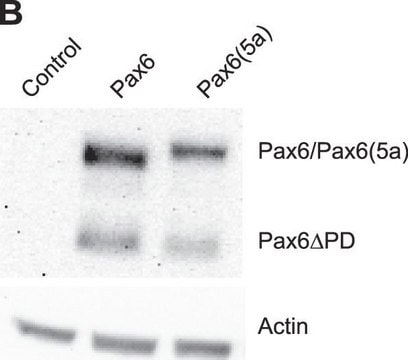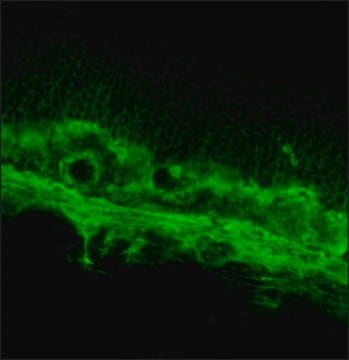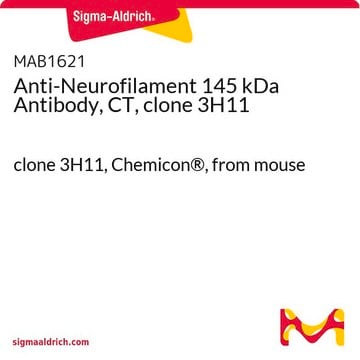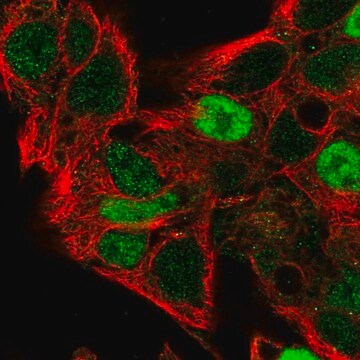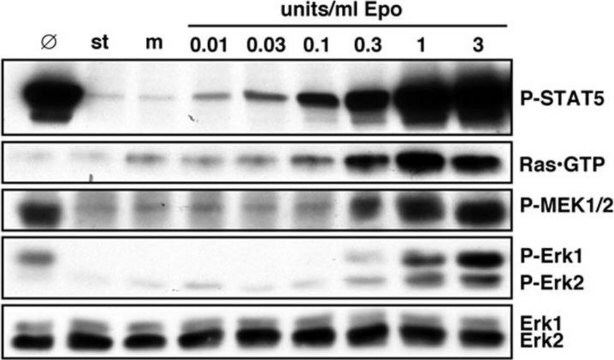推荐产品
生物源
mouse
品質等級
抗體表格
ascites fluid
抗體產品種類
primary antibodies
無性繁殖
AD1.5, monoclonal
物種活性
zebrafish, rat, human, chicken, mouse
製造商/商標名
Chemicon®
技術
immunohistochemistry: suitable
western blot: suitable
同型
IgG1
NCBI登錄號
UniProt登錄號
運輸包裝
dry ice
目標翻譯後修改
unmodified
基因資訊
human ... PAX6(5080)
特異性
Recognizes Pax6.
免疫原
Recombinant human Pax6.
應用
Anti-Pax6 Antibody, clone AD1.5 is an antibody against Pax6 for use in IH & WB.
Research Category
Neuroscience
Neuroscience
Research Sub Category
Developmental Neuroscience
Neuronal & Glial Markers
Developmental Neuroscience
Neuronal & Glial Markers
Western blot. The antibody recognizes the 46 and 48 kDa Pax6 proteins.Immunohistochemistry on frozen tissue sections.Optimal working dilutions must be determined by end user.
標靶描述
46 & 48 kDa
外觀
Unpurified
Ascites fluid containing no preservatives.
儲存和穩定性
Maintain for 1 year at -20°C from date of shipment. Aliquot to avoid repeated freezing and thawing. For maximum recovery of product, centrifuge the original vial after thawing and prior to removing the cap.
分析報告
Control
Embryonic eye tissue
Embryonic eye tissue
其他說明
This product can not be purchased for resale.
Concentration: Please refer to the Certificate of Analysis for the lot-specific concentration.
法律資訊
CHEMICON is a registered trademark of Merck KGaA, Darmstadt, Germany
免責聲明
Unless otherwise stated in our catalog or other company documentation accompanying the product(s), our products are intended for research use only and are not to be used for any other purpose, which includes but is not limited to, unauthorized commercial uses, in vitro diagnostic uses, ex vivo or in vivo therapeutic uses or any type of consumption or application to humans or animals.
未找到合适的产品?
试试我们的产品选型工具.
儲存類別代碼
10 - Combustible liquids
水污染物質分類(WGK)
WGK 1
閃點(°F)
Not applicable
閃點(°C)
Not applicable
Sergey Malchenko et al.
Gene, 534(2), 400-407 (2013-08-21)
In vitro neural differentiation of human embryonic stem cells (hESCs) is an advantageous system for studying early neural development. The process of early neural differentiation in hESCs begins by initiation of primitive neuroectoderm, which is manifested by rosette formation, with
Caroline A Johnson et al.
Development (Cambridge, England), 147(4) (2020-02-01)
Cellular and molecular mechanisms underlying the switch from self-amplification of cortical stem cells to neuronal and glial generation are incompletely understood, despite their importance for neural development. Here, we have investigated the role of the transcription factor specificity protein 2
Christen M Crosta et al.
Molecular and cellular neurosciences, 109, 103562-103562 (2020-09-29)
Abnormal dendritic arbor development has been implicated in a number of neurodevelopmental disorders, such as autism and Rett syndrome, and the neuropsychiatric disorder schizophrenia. Postmortem brain samples from subjects with schizophrenia show elevated levels of NOS1AP in the dorsolateral prefrontal
Louise Thiry et al.
Communications biology, 7(1), 238-238 (2024-02-29)
The fatal motor neuron (MN) disease Amyotrophic Lateral Sclerosis (ALS) is characterized by progressive MN degeneration. Phrenic MNs (phMNs) controlling the activity of the diaphragm are prone to degeneration in ALS, leading to death by respiratory failure. Understanding of the
Ramsey Najm et al.
Cell reports, 32(4), 107962-107962 (2020-07-30)
Despite its clear impact on Alzheimer's disease (AD) risk, apolipoprotein (apo) E4's contributions to AD etiology remain poorly understood. Progress in answering this and other questions in AD research has been limited by an inability to model human-specific phenotypes in
我们的科学家团队拥有各种研究领域经验,包括生命科学、材料科学、化学合成、色谱、分析及许多其他领域.
联系技术服务部门![Anti-OCT-4 [POU5F1] Antibody, clone 7F9.2 clone 7F9.2, from mouse](/deepweb/assets/sigmaaldrich/product/images/307/874/7354f72d-80ee-40a5-b7fa-0590fe6784cc/640/7354f72d-80ee-40a5-b7fa-0590fe6784cc.jpg)
